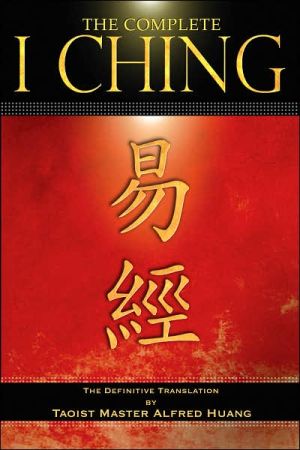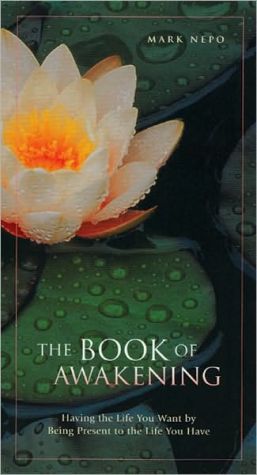The Complete I Ching: The Definitive Translation
In "The Complete I Ching", an eminent Chinese scholar translated the original ideographs of the I Ching into English. This book also includes a new emphasis on the intricate web of interrelations among the names and sequence of the 64 hexagrams, the preservation of the original poetic style, plus more.
Search in google:
The first translation to honor the authentic Chinese spirit of the Book of Change For more than 3000 years the I Ching has been the most important book of divination in the world. Yet it has always been translated by Westerners who brought their own cultural biases to the work. Now, for the first time, an eminent Chinese scholar has translated the original ideograms of the I Ching into English. Imprisoned and sentenced to death during the Cultural Revolution in 1966, Master Alfred Huang studied the I Ching in secret with some of China's greatest minds. Released in 1979, he emigrated to the United States, where he discovered that no I Ching existed in English that truly understood the Chinese mind. This book is the product of his desire to right that situation. To the Chinese, the I Ching is nothing without the Confucian commentaries known as the Ten Wings. Previous editions have given them only a minor place in the book, or have left them out altogether. In this new translation, they are restored to their central importance by Master Huang. This book also emphasizes the intricate connections between the 64 possible hexagrams, and introduces several new methods for doing readings. Intuition "A careful comparison of Huang's translation with the Wilhelm, Legge, and Blofeld versions reveals its superiority in nearly every respect."
Chapter 16\ Yü-Delight\ Zhen-Thunder\ Kun-Earth\ Name and Structure\ Yü originally meant delight: today it also means peace and happiness. Delight is the inverse of the preceding gua, Humbleness. Humbleness leads people to delight. Thus, Humbleness and Delight are complementary. Wilhelm translates Yü as Enthusiasm; Blofeld translates it as Repose. In this book I follow the original meaning, Delight.\ Sequence of the Gua: When one’s harvest is great and one can still remain humble, there is sure to be an outburst of delight. Thus, after Humbleness, Delight follows.\ The ideograph of this gua is a very old form consisting of two parts. The left portion is an ideograph of yü, which means hand out or give something away. There are two hands at the top and a vertical straight line connected to the lower hand, representing the arm. Between the two hands there is a little object. Taken as a whole it is a picture of the act of giving and receiving. The right portion of the ideograph represents an elephant, xiang. The elephant is standing upright on two rear legs with the tail touching the ground. The two front legs are held up in the air. The head of the elephant is looking forward with the long trunk curling upward. In the past there were elephants in the southern part of China, though they no longer exist there. In southern China, elephants were trained to help workers carry heavy things, but in the north they were trained for the purpose of giving people pleasure and delight. People performed a kind of dance known as the elephant dance, which King Wu was fond of. The two parts of the ideograph together mean delight—enjoyed by oneself or given to others.\ The structure of this gua is Thunder above, Earth below. Thunder represents action, and Earth submission. These two primary gua standing together symbolize the action of the yang element followed delightfully by all the yin elements. In ancient China, people believed that the power of thunder had influence for a distance of a hundred li (a Chinese unit of length designating about one-third of a mile), equivalent to the realm of a feudal lord. For this reason, the Decision says, “Favorable to establish feudal lords and mobilize the multitude.” Earth is the symbol of a multitude. And establishing feudal lords means gaining assistance.\ Decision\ Delight.\ Favorable to establish feudal lords\ And mobilize the multitude.\ Commentary on the Decision\ Delight.\ The firm meets with response.\ Its will is fulfilled.\ Acting in accord with the time and moving forward;\ This is Delight.\ Delight.\ Acting in accord with the time and moving forward;\ It is following the way of Heaven and Earth.\ How much more will it be so\ In establishing feudal lords and mobilizing the multitude?\ Heaven and Earth move in accordance with the time;\ Therefore sun and moon do not deviate from their courses,\ And the four seasons do not err.\ The holy person moves in accordance with the time and situation;\ Therefore punishments and penalties become just,\ And people are genuinely convinced.\ Great indeed are the time and significance of Delight!\ Commentary on the Symbol\ Thunder comes out of the Earth,\ Rising and stirring:\ An image of Delight.\ In correspondence with this,\ The ancient king composed music to honor virtue and merit;\ With ardent eagerness, he offered it to God\ And shared it with his ancestors.\ Yao Text\ 1. Initial Six\ Singing out delight:\ Misfortune.\ Singing out delight:\ One’s will comes to an end.\ 2. Second Six\ Firm as rock,\ Not merely for a whole day.\ Being steadfast and upright: good fortune.\ Not merely for a whole day.\ Being steadfast and upright: good fortune.\ It is central and correct.\ 3. Third Six\ Staring upward, wallowing in delight:\ Regret.\ Delaying:\ Regret again.\ Staring upward, wallowing in delight,\ There is regret.\ The place is not appropriate.\ 4. Fourth Nine\ Cause of delight;\ Great accumulation obtained.\ Be not suspicious.\ Gather friends around you,\ As a hair clasp holds hair together.\ Cause of delight;\ Great accumulation obtained.\ One’s will is bold enough to fulfill great aims.\ 5. Fifth Six\ Be steadfast and upright.\ Even sick,\ Still persist.\ Won’t die.\ Be steadfast and upright, even sick,\ Resting upon a solid line.\ Still persistent; won’t die.\ The central way averts death.\ 6. Top Six\ Dark delight.\ Make a change:\ No fault.\ Dark delight reaches the top.\ How could it last long?\ Significance\ The name of this gua is Delight, but the Yao Text is not so delightful. The aim of this gua is to expound the principle of harmony and delight. When one has accomplished great achievements and still remains humble, people will be delighted to gather around. However, this gua does not describe a situation of harmony and delight, but gives warning against self-satisfaction. It is too easy for one to indulge in one’s own pleasure and forget the delight of other people. To the Duke of Zhou, delight was not for one’s own sake but for all. The key is humility and sincerity; these two qualities bring harmony. This is the true meaning of Delight.\ The image of this gua is Thunder above, Earth below. Thunder is the sound of yang energy. Thus, Confucius says, “The ancient king composed music to honor virtue and merit; with ardent eagerness, he offered it to God.” When thunder bursts above the Earth, myriad beings are nourished by its yang energy and become delighted and alive. It is a time of enthusiasm and delight. An enthusiastic and delighted mood is helpful to one’s success, but overenthusiasm and too much delight cause self-satisfaction. And self-satisfaction can lead to misfortune. For this reason, all the lines in this gua portend misfortune, except the second line.
AcknowledgmentsPrefaceTen Contributions of This TranslationAbout the TranslationHow to Use This BookIntroductionFlying with the I ChingThe Upper Canon1. Qian * Initiating2. Kun * Responding3. Zhun * Beginning4. Meng * Childhood5. Xu * Needing6. Song * Contention7. Shi * Multitude8. Bi * Union9. Xiao Xu * Little Accumulation10. Lu * Fulfillment11. Tai * Advance12. Pi * Hindrance13. Tong Ren * Seeking Harmony14. Da You * Great Harvest15. Qian * Humbleness16. Yu * Delight17. Sui * Following18. Gu * Remedying19. Lin * Approaching20. Guan * Watching21. Shi He * Eradicating22. Bi * Adorning23. Bo * Falling Away24. Fu * Turning Back25. Wu Wang * Without Falsehood26. Da Xu * Great Accumulation27. Yi * Nourishing28. Da Guo * Great Exceeding29. Kan * Darkness30. Li * BrightnessThe Lower Canon31. Xian * Mutual Influence32. Heng * Long Lasting33. Dun * Retreat34. Da Zhuang * Great Strength35. Jing * Proceeding Forward36. Ming Yi * Brilliance Injured37. Jia Ren * Household38. Kui * Diversity39. Jian * Hardship40. Jie * Relief41. Sun * Decreasing42. Yi * Increasing43. Guai * Eliminating44. Gou * Encountering45. Cui * Bringing Together46. Sheng * Growing Upward47. Kun * Exhausting48. Jing * Replenishing49. Ge * Abolishing the Old50. Ding * Establishing the New51. Zhen * Taking Action52. Gen * Keeping Still53. Jian * Developing Gradually54. Gui Mei * Marrying Maiden55. Feng * Abundance56. Lu * Traveling57. Zun * Proceeding Humbly58 Dui * Joyful59. Huan * Dispersing60. Jie * Restricting61. Zhong Fu * Innermost Sincerity62. Ziao Guo * Little Exceeding63. Ji Ji * Already Fulfilled64. Wei Ji * Not Yet FulfilledA Brief History of the Zhou DynastyGlossaryIndex
\ IntuitionThe publisher's decision to call this 'the definitive translation' might at first seem presumptuous, given the fact that generations of readers have come to venerate the Wilhelm, Legge, and Blofeld versions. However, a careful comparison of Huang's translation with these prior classics reveals it superiority in nearly every respect. Readers interested in acquainting themselves with the I Ching for the first time need to look no further; those who have formed a deep personal attachment to a previous translation owe it to themselves to explore this one as well.\ —Dec 1998\ \ \ \ \ Intuition“A careful comparison of Huang’s translation with the Wilhelm, Legge, and Blofeld versions reveals its superiority in nearly every respect. Readers interested in acquainting themselves with the I Ching for the first time need to look no further; those who have formed a deep personal attachment to a previous translation owe it to themselves to explore this one as well.”\ \ \ The Book Reader“What is constant through this translation is both a sense of tradition and an appreciation of modernity. Throughout is a philosophical calmness, a sense of the intellectual mingling with the spirit of things. Most importantly, Huang makes this a useful I Ching, more useful for the current temperament than older, more self-conscious translations.”\ \ \ \ \ Mike Gleason“This translation, from a Taoist master, is the most extensive treatment of the subject I have ever encountered. . . . the quality of the work is so exceptional that it is hard to find fault with it. . . . if you wish to learn this system, this book will be an indispensable aid to your education. There is such a wealth of information contained in this book (each page contains the hexagram being discussed and the ideograph of the name, so there is no confusion) that it is hard to overstate the usefulness of this work. . . . This it is of use and benefit for both the novice and the more experienced user.”\ \ \ \ \ Reg Little“Huang succeeds, also, in producing a work that keeps opening up new vistas of understanding and inviting the reader to explore the many layers of discovery offered by the mathematical, visual and literary dimensions of the classic.”\ \ \ \ \ Light of Consciousness Journal“. . . this 10th Anniversary Edition of Master Huang’s translation brings new light to understanding and utilizing this ancient wisdom.”\ \ \ \ \ Elizabeth Hazel“This book is an absolute requirement for those who rely upon the I-Ching, and most highly recommended as a primary text for anyone wishing to learn how to use it. Highest recommendations to author and publisher - excellent!”\ \ \ \ \ Book News“Impressive for its scope and the clarity of its translation, this 10th anniversary edition features a new introduction by Huany on the history and application of the I-Ching, with descriptions of the commentary and divination methods.”\ \








